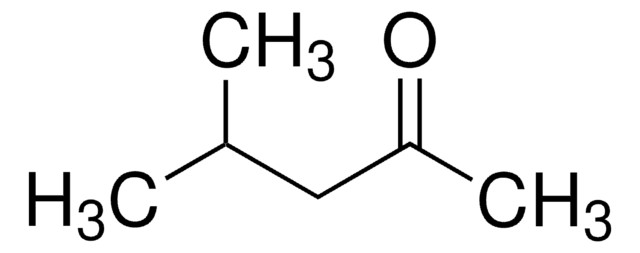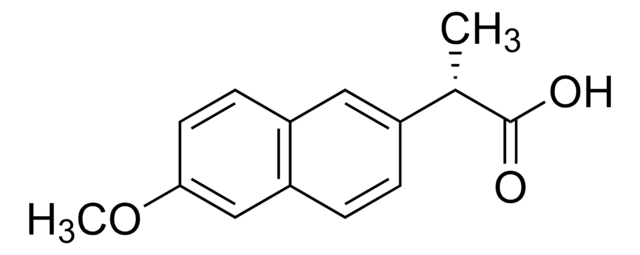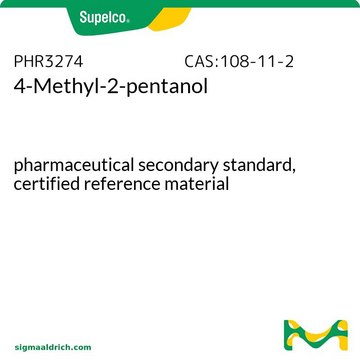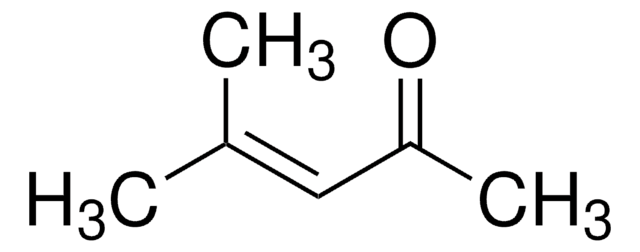PHR1556
Methyl Isobutyl Ketone
Pharmaceutical Secondary Standard; Certified Reference Material
Synonym(s):
4-Methyl-2-pentanone, Isobutyl methyl ketone, Isopropylacetone, MIBK, Methyl isobutyl ketone
About This Item
Recommended Products
grade
certified reference material
pharmaceutical secondary standard
Quality Level
Agency
traceable to USP 1430203
vapor density
3.5 (vs air)
CofA
current certificate can be downloaded
autoignition temp.
840 °F
expl. lim.
1.2-8 %, 93 °F
packaging
ampule of 3x1.2 mL each
technique(s)
HPLC: suitable
gas chromatography (GC): suitable
refractive index
n20/D 1.395 (lit.)
bp
117-118 °C
mp
−80 °C (lit.)
density
0.801 g/mL at 25 °C (lit.)
application(s)
pharmaceutical (small molecule)
format
neat
storage temp.
2-30°C
SMILES string
CC(C)CC(C)=O
InChI
1S/C6H12O/c1-5(2)4-6(3)7/h5H,4H2,1-3H3
InChI key
NTIZESTWPVYFNL-UHFFFAOYSA-N
Looking for similar products? Visit Product Comparison Guide
General description
Application
Analysis Note
Other Notes
Footnote
Recommended products
Signal Word
Danger
Hazard Statements
Precautionary Statements
Hazard Classifications
Acute Tox. 4 Inhalation - Carc. 2 Inhalation - Eye Irrit. 2 - Flam. Liq. 2 - STOT SE 3
Target Organs
Central nervous system
Supplementary Hazards
Storage Class Code
3 - Flammable liquids
WGK
WGK 1
Flash Point(F)
57.2 °F - closed cup
Flash Point(C)
14 °C - closed cup
Choose from one of the most recent versions:
Certificates of Analysis (COA)
It looks like we've run into a problem, but you can still download Certificates of Analysis from our Documents section.
If you need assistance, please contact Customer Support.
Already Own This Product?
Find documentation for the products that you have recently purchased in the Document Library.
Customers Also Viewed
Articles
Butyl methyl ether; Acetic acid; 2-Butanone; Ethyl acetate; Tetrahydrofuran; 1-Butanol; Isopropyl acetate; Heptane; Propyl acetate; 3-Methylbutanol; 4-Methyl-2-pentanone; Isobutyl acetate; Butyl acetate; Dimethyl sulfoxide; Anisole; Cumene
Protocols
Separation of 4-Methyl-2-pentanone; Dimethyl disulfide; Hexanal; 3-Methylpentane; Acetone
Protocol for GC Analysis of Class 3 Residual Solvents on SUPELCOWAX® 10
US EPA Method 8260 describes the analysis of volatile organic compounds in solid wastes and ground waters. This application illustrates the analysis of many compounds commonly analyzed by this method using purge and trap coupled to GC-MS.
Our team of scientists has experience in all areas of research including Life Science, Material Science, Chemical Synthesis, Chromatography, Analytical and many others.
Contact Technical Service










